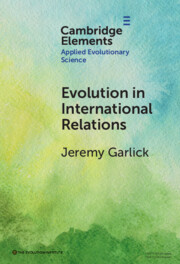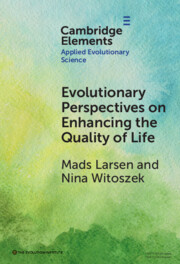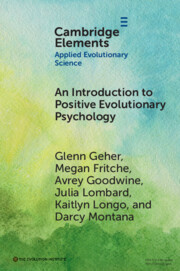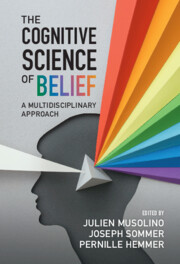Refine search
Actions for selected content:
76 results
Chapter 11 - The Human Sciences and the “Theory of Women”
- from Part III - Interventions
-
-
- Book:
- Science and Humanism
- Published online:
- 09 October 2025
- Print publication:
- 23 October 2025, pp 239-262
-
- Chapter
-
- You have access
- Open access
- HTML
- Export citation
2 - Darwin’s Reinach
- from Part I - Reinach and His Method
-
-
- Book:
- Reinach and the Foundations of Private Law
- Published online:
- 20 July 2025
- Print publication:
- 07 August 2025, pp 52-81
-
- Chapter
-
- You have access
- Open access
- HTML
- Export citation
Can followers detect political leaders who cheat? Testing an evolutionary position
-
- Journal:
- Political Science Research and Methods , First View
- Published online by Cambridge University Press:
- 17 June 2025, pp. 1-18
-
- Article
-
- You have access
- Open access
- HTML
- Export citation

Evolution in International Relations
-
- Published online:
- 07 February 2025
- Print publication:
- 06 March 2025
-
- Element
- Export citation
How much conversation content is actually social: human conversational behaviour revisited
-
- Journal:
- Language and Cognition / Volume 17 / 2025
- Published online by Cambridge University Press:
- 09 January 2025, e11
-
- Article
-
- You have access
- Open access
- HTML
- Export citation
Guilt aversion and moral commitment: Eve versus Adam
-
- Journal:
- Journal of the Economic Science Association / Volume 10 / Issue 2 / December 2024
- Published online by Cambridge University Press:
- 01 January 2025, pp. 578-594
-
- Article
-
- You have access
- Open access
- HTML
- Export citation

Evolutionary Perspectives on Enhancing Quality of Life
-
- Published online:
- 13 April 2024
- Print publication:
- 23 May 2024
-
- Element
-
- You have access
- Open access
- HTML
- Export citation
9 - The Evolution of Religiosity
-
- Book:
- Exploring Religious Pluralism
- Published online:
- 14 March 2024
- Print publication:
- 21 March 2024, pp 135-154
-
- Chapter
- Export citation
16 - Evolutionary Psychology
-
-
- Book:
- Human Behavioral Ecology
- Published online:
- 07 March 2024
- Print publication:
- 14 March 2024, pp 380-401
-
- Chapter
- Export citation
3 - What Is Emotion?
-
- Book:
- Pragmatics and Emotion
- Published online:
- 13 December 2023
- Print publication:
- 21 December 2023, pp 29-51
-
- Chapter
- Export citation
5 - Modularity
- from II - The Never-Ending Debate
-
- Book:
- A Mind for Language
- Published online:
- 13 October 2023
- Print publication:
- 21 September 2023, pp 130-150
-
- Chapter
- Export citation
Cultural evolution from the producers’ standpoint
-
- Journal:
- Evolutionary Human Sciences / Volume 5 / 2023
- Published online by Cambridge University Press:
- 09 August 2023, e25
-
- Article
-
- You have access
- Open access
- HTML
- Export citation

An Introduction to Positive Evolutionary Psychology
-
- Published online:
- 25 April 2023
- Print publication:
- 18 May 2023
-
- Element
- Export citation
Cognitive Bias
-
- Article
- Export citation
7 - Where Did It All Come From?
- from Part III - Rights and Moral Cognition
-
- Book:
- Mind and Rights
- Published online:
- 09 February 2023
- Print publication:
- 16 February 2023, pp 356-401
-
- Chapter
-
- You have access
- Open access
- HTML
- Export citation
Chapter 2 - Why Are We Interested in Serial Killers?
-
- Book:
- Just as Deadly
- Published online:
- 06 January 2023
- Print publication:
- 09 February 2023, pp 17-31
-
- Chapter
- Export citation
Chapter 5 - Episodic Memory
-
- Book:
- Cognitive Ontology
- Published online:
- 15 January 2023
- Print publication:
- 05 January 2023, pp 123-157
-
- Chapter
- Export citation
Chapter 4 - Domain Specificity
-
- Book:
- Cognitive Ontology
- Published online:
- 15 January 2023
- Print publication:
- 05 January 2023, pp 100-122
-
- Chapter
- Export citation
Chapter 10 - Cultural Evolutionary Psychology of Belief
- from Evolutionary Psychology of Beliefs
-
-
- Book:
- The Cognitive Science of Belief
- Published online:
- 03 November 2022
- Print publication:
- 17 November 2022, pp 209-230
-
- Chapter
- Export citation

The Cognitive Science of Belief
- A Multidisciplinary Approach
-
- Published online:
- 03 November 2022
- Print publication:
- 17 November 2022
